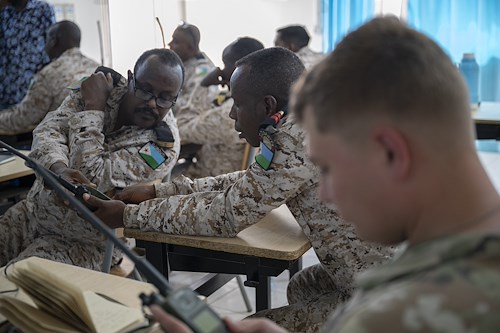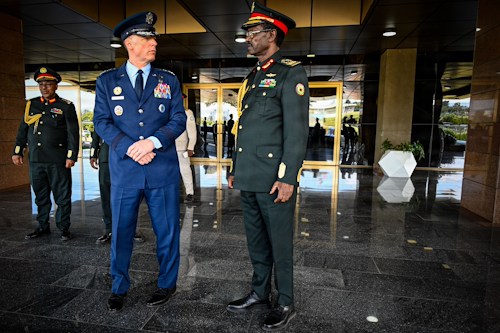Gallery contains 7 images
×
Photo 1 of 7
Combined Joint Task Force - Horn
U.S. Soldiers assigned to the Kentucky Army National Guard participate in a radio communications knowledge exchange with Djiboutian soldiers at the Djiboutian signal corp compound in Djibouti City, Djibouti, July 14, 2025. The state partnership program conducts military-to-military engagements in support of U.S. defense security goals, facilitating cooperation across all levels of international civil-military affairs, and encouraging relationship building at the state level. (U.S. Air Force photo by Staff Sgt. Marcus Hardy-Bannerman)
Photo by: Staff Sgt. Marcus Hardy-Bannerma
Photo 2 of 7
Combined Joint Task Force - Horn
U.S. Marine Corps Maj. Justin Szabo, U.S. Africa Command Communications program manager, briefs Djiboutian soldiers during a knowledge exchange at the Djiboutian signal corp compound in Djibouti City, Djibouti, July 14, 2025. The knowledge exchange covered network security and radio communication principles, advancing Combined Joint Task Force - Horn of Africa efforts to increase interoperability between U.S. and host nation forces. (U.S. Air Force photo by Staff Sgt. Marcus Hardy-Bannerman)
Photo by: Staff Sgt. Marcus Hardy-Bannerma
Photo 3 of 7
Combined Joint Task Force - Horn
U.S. Army Sgt. 1st Class Garrett Hufana, center, information technology specialist with the 149th Maneuver Enhancement Brigade, Kentucky Army National Guard, participates in a radio communications knowledge exchange with Djiboutian soldiers at the Djiboutian signal corp compound in Djibouti City, Djibouti, July 14, 2025. Knowledge exchanges build trust and strengthen mutual understanding by sharing subject matter expertise that support efforts to advance U.S. and partner force capabilities. (U.S. Air Force photo by Staff Sgt. Marcus Hardy-Bannerman)
Photo by: Staff Sgt. Marcus Hardy-Bannerma
Photo 4 of 7
Combined Joint Task Force - Horn
U.S. Soldiers assigned to the Kentucky Army National Guard participate in a radio communications knowledge exchange with Djiboutian soldiers at the Djiboutian signal corp compound in Djibouti City, Djibouti, July 14, 2025. The knowledge exchange covered network security and radio communication principles, advancing Combined Joint Task Force - Horn of Africa efforts to increase interoperability between U.S. and host nation forces. (U.S. Air Force photo by Staff Sgt. Marcus Hardy-Bannerman)
Photo by: Staff Sgt. Marcus Hardy-Bannerma
Photo 5 of 7
Combined Joint Task Force - Horn
U.S. Army 1st Lt. Thiery Byishimo, signal officer with the 149th Signal Company, Kentucky Army National Guard, participates in a radio communication knowledge exchange with Djiboutian soldiers at the Djiboutian signal corp compound in Djibouti City, Djibouti, July 14, 2025. The state partnership program conducts military-to-military engagements in support of U.S. defense security goals, facilitating cooperation across all levels of international civil-military affairs and encouraging relationship building at the state level. (U.S. Air Force photo by Staff Sgt. Marcus Hardy-Bannerman)
Photo by: Staff Sgt. Marcus Hardy-Bannerma
Photo 6 of 7
Combined Joint Task Force - Horn
Djiboutian soldiers participate in a communication network knowledge exchange at the Djiboutian signal corp compound in Djibouti City, Djibouti, July 14, 2025. Knowledge exchanges build trust and strengthen mutual understanding by sharing subject matter expertise that support efforts to advance U.S. and partner force capabilities. (U.S. Air Force photo by Staff Sgt. Marcus Hardy-Bannerman)
Photo by: Staff Sgt. Marcus Hardy-Bannerma
Photo 7 of 7
Combined Joint Task Force - Horn
U.S. Africa Command, Combined Joint Task Force - Horn of Africa personnel, and Djiboutian soldiers conduct a communications network knowledge exchange at the Djiboutian signal corp compound in Djibouti City, Djibouti, July 14, 2025. The knowledge exchange covered network security and radio communication principles, advancing Combined Joint Task Force - Horn of Africa efforts to increase interoperability between U.S. and host nation forces. (U.S. Air Force photo by Staff Sgt. Marcus Hardy-Bannerman)
Photo by: Staff Sgt. Marcus Hardy-Bannerma
In the East Africa region where a single breached network can ripple across borders, Djiboutian soldiers and U.S. service members spent four focused days, July 13 to 16, shoulder-to-shoulder inside classrooms and comms bays, testing defenses, hunting cyber threats, and refining the radio skills that keep missions moving.
U.S. Africa Command (AFRICOM), Combined Joint Task Force – Horn of Africa (CJTF-HOA), and the Kentucky Army National Guard teamed up with Djiboutian forces for a cybersecurity and radio communications fundamentals skills-sharing initiative that blended instruction, live demonstrations, and practical exercises.
Participants drilled on network monitoring, threat detection, and the employment of essential cybersecurity tools, then shifted to radio communications principles and operational techniques that underpin crisis response and day-to-day coordination between the two nations.
“Combining all these efforts is an opportunity not only to strengthen CJTF-HOA’s relationship with the Djiboutian armed forces, but also AFRICOM’s broader engagement with Djibouti through the State Partnership Program,” said U.S. Army 2nd Lt. Jacob Henley, CJTF-HOA’s cyber planner.
The initiative, led by the Kentucky National Guard through the State Partnership Program (SPP), is designed to be repeatable and scalable, building habits that are sustainable.
“The trust built during exchanges such as this (is) critical to the development of a more secure environment in the region,” said U.S. Army Capt. Joseph Pollock, CJTF-HOA’s cyber and electromagnetic activities chief. “The National Guard brings a unique mix of domestic response experience and technical depth that translates directly to our partners’ needs.”
Administered by the National Guard Bureau and guided by U.S. Department of State foreign policy, the SPP links National Guard troops with partner-nation militaries to advance shared security objectives in support of combatant commanders and U.S. Embassy Chiefs of Mission. For Djibouti and Kentucky that linkage turns relationships into repeatable outcomes yielding faster detection, clearer communications, and teams that already know each other when a crisis hits.
“Strengthening partner nations’ ability to secure their own networks and infrastructure improves regional cyber resilience and mitigates threats that can undermine stability,” said U.S. Marine Corps Maj. Justin Szabo, AFRICOM’s Communications program manager. “These efforts enhance the collective security of U.S., allied, and partner operations throughout the CJTF-HOA and AFRICOM areas of responsibility.”
For the Djiboutian and U.S. service members in the room, the value was immediate. The initiative enabled practical reps, shared problem-solving, and a common operating picture that will help both teams grow sharper with every future engagement.
For the region, the partnership is another brick in a wider wall of resilience that will continue to be built together one exchange at a time.

























